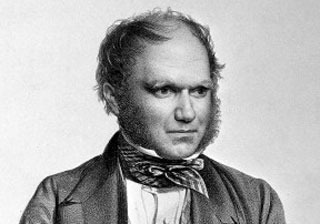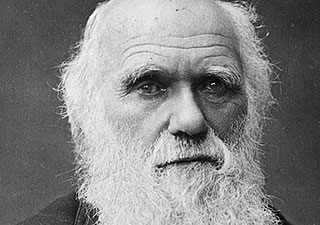 |
TheDarwinianRevolution |
 |
 |
TheDarwinianRevolution |
 |
Current AnnouncementsNothing to see here folks. Move along. This page last updated: November 29, 2007 |
The anthropologist Ashley Montagu argued that “next to the Bible, no work has been quite as influential, in virtually every aspect of human thought, as The Origin of Species.” This course provides historical background to the development of, and reaction to, Charles Darwin's ideas in Origin (and his other writings) while examining the influence of Darwin(ism) on political thought, philosophy, social policy, and intellectual history. We end with examining the question, “Was there a Darwinian revolution?”
Instructor: Dr. John M. Lynch, (john dot lynch at asu dot edu), Irish A 219, Tuesday 9:00 - 10:30 & Wednesday 12:00 - 1:30.
Teaching Assistant: Jennifer Minneci, (jennifer dot minneci at asu dot edu), LSC 276, Wednesday 9:00 - 11:00.
You will need a copy of the first or second edition of Origin of Species. These editions have fourteen (rather than fifteen) chapters and are measurably clearer than later editions. The recommended edition is the Oxford World Classics edition of 1998. The Harvard University Press facsimile edition edited by Ernst Mayr is also appropriate. The first edition is also available online (though I prefer you utilze a printed copy as that allows you to annotate your edition).
Any other required readings will be made available online on this page.
No extra credit assignments will be made available, so don't ask! Assignments not submitted electronically and on paper by 3:15pm on the due date will recieve a zero for the assignment - no exceptions will be made. Plan accordingly.
Aug 20th |
Introduction and viewing of Darwin's Dangerous Idea (PBS, 2001) A copy of the syllabus is here. |
|
Aug 27th |
Defining the Problem: Death & Design We're going to be examining two major ideas - the argument that the natural world provides evidence for the actions of a Designer God (and thus no naturalistic mechanism can explain the diversity of life) and development of ideas regarding the fossil record. Key People: David Hume, William Paley, William Buckland, Charles Lyell Key Ideas: Evidentialism, Fideism, Natural Theology, The Design Argument, The Problem of Evil, Stratigraphy, Neptunism, Plutonism, Actualism, Uniformitarianism |
|
Sep 3rd |
No class – Labor Day |
|
Sep 10th |
"Those Frenchified Ideas"
Key People: Buffon, Cuvier, Lamarck, Chambers, Sedgwick, Key Ideas: Materialism, Naturalism, The "Escaltor of Life", Use and Disuse, Inheritance of Acquired Characteristics, As I mentioned, I have written two documents that will provide information on Chambers and Vestiges. The first in a biographical entry on Chambers while the second is a general introduction to the reception of Vestiges. Lastly, here is more information of Adam Sedgwick. You will be expected to be familiar with all three of these documents. |
|
Sep 17th |
Darwin’s Life
Key People: Charles Darwin :) John Stevens Henslow; Robert Fitzroy Key Ideas: No major concepts arose from the class. Pay attention to the story of Darwin's life and the major events and places. |
|
Sep 24th |
Summary of Origin due. We will be examining Darwin's central idea - natural selection - as well as the arguments he mounts in Origin, Descent of Man, and Expression of Emotions. The aim overall will be to get a clear idea of what "Darwinism" actually means. Key People: Patrick Matthew; Edward Blyth; William Wells; Herbert Spencer; Key Ideas: The logic of natural selection; Evolution as fact, pathway & mechanism; Analysis of selection events in Galapagoes finches; Analysis of selection in peppered moths; Types of selection; Sexual selection; Darwinism. |
|
Oct 1st |
Class cancelled due to instructor illness. |
|
Oct 8th |
We will start our examination of the varied responses to Darwin with two individuals who opposed his ideas - Richard Owen and Louis Aggasiz - both of whom were inculcated with a Romantic 18th century view of organismal form and function. Key People:Richard Owen; Louis Agassiz; Adam Sedgwick; George Campbell; H.C. Fleeming Jenkin; Charles Hodge; Gideon Mantell; Thomas Henry Huxley; Key Ideas: Functionalism; Idealist morphology; Homology; Vertebrate archaetype; Agassiz' legacy |
|
Oct 15th |
Continuing our examination of responses to Darwin's ideas, we will look at Thomas Henry Huxley (referred to as "Darwin's Bulldog), Alfred Russel Wallace (the co-discoverer of natural selection), and a relatively unknown anatomist by the name of St George Jackson Mivart. The contrasts between the three nicely illustrate how various individuals understood "Darwinism" in light of their religious and secular viewpoints. Key People:Thomas Henry Huxley; John Tyndall; Alfred Russel Wallace; St George Jackson Mivart; Key Ideas: Man's Place in Nature; Linear Trends; Huxley and changes in science; Power of natural selection; Spiritualism; On the Genesis of Species; |
|
Oct 22nd |
The modern eugenic movement arose in the late nineteenth century with the writings of Francis Galton. For various reasons, the movement failed in Britain but became very popular in this country, resulting in legislation that restricted immigration and allowed forced sterilization. Key ideas: Positive & negative eugenics; Anthropometry; IQ testing; Immigration Restriction Act of 1924; Key People: Francis Galton; Charles Davenport; Carrie Buck; Harry Laughlin |
|
Oct 29th |
Last week we saw that American supporters of eugenics held political views that would be most likely classified as "Far-Right" today. Yet today acceptance of evolution and Darwinism is strongest on the Left. We will examine how various political groups have used Darwin's ideas (and name) to justify their ideas, and question whether Darwinism can support any political system. Key Ideas: Conservative beliefs; Creationists & Haeckel; Social Darwinism; Key People: Karl Marx; Friedrich Nietzsche; Peter Singer; Ernst Haeckel; Herbert Spencer; Larry Arnhart |
|
Nov 5th |
Second assignment due. Please remember that electronic copy (as a Word, RTF, or text file) is required via SafeAssignment by 3:00pm. A printed copy is due by 3:15pm sharp in class. No late assignments will be accepted. This week we will be finishing off our examination of political aspects of Darwinism by looking at American opposition to evolution. We will briefly examine attacks by biblical literalists before concentrating on the modern Intelligent Design (ID) movement. We will not have sufficient time to examine many of the claims made by these opponents of evolution: interested students are invited to take my Spring course HPS 311/BIO 344: Origins, Evolution & Creation to full explore the history of these ideas (and why mainstream science rejects them). The course fulfills learning goals 1, 2, 3 & 'A' of Track 2 ("History and Philosophy of Science") of the CLAS Science & Society requirement. Key Ideas: Young Earth Creationism; Scientific Creationism; McLean v. Arkansas; Edwards v. Aguillard; Kitzmiller v. Dover; Three Prongs of ID; Icons of Evolution; The Wedge (Document); Key People: Phillip E. Johnson; William Dembski; Michael Behe; |
|
Nov 12th |
No class – Veterans Day |
|
Nov 19th |
Apologies for not getting the notes up online before class. Key Ideas: Pragmatism; Epistemology; Evolutionary Epistemology; General Selection Theory; EEM/EET; Meme; Evolutionary Ethics; EMM/EMT; Altruism; Inclusive Fitness Altruism; Reciprocal Altruism; Hamilton's Rule; Haplodiploidy; Prisoner's Dilemma; Key People: William James; Charles Pierce; John Dewey; Richard Rorty; Karl Popper; Thomas H. Huxley; |
|
Nov 26th |
Class this week is our last real class session (as the exam will be the following week). We have three things on the agenda:
|
|
Dec 3rd |
Final Examination
|